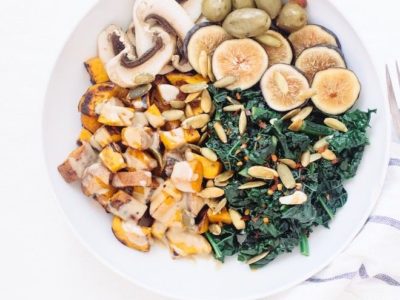
Key Takeaways
- The best plant-based protein powder should be high in essential amino acids, easily digested, absorbed, and processed by the body, and taste good.
- Pea protein, rice protein, and quinoa protein are the top three best plant-based protein powders that meet these criteria.
- Keep reading if you want to learn more about what makes these plant proteins the best, and the single best plant-based protein powder you can buy.
Just a few years ago, only a handful of companies sold plant-based protein powders.
Now?
It’s hard to choose from the smorgasbord of options, all of which claim to be the best.
What’s more, there are myriad different kinds of plant-based protein powder to choose from including soy, hemp, pea, rice, quinoa, fungal (mycoprotein), and more.
So, which one should you choose?
What actually makes the best plant-based protein powder, anyway?
You’ll learn the answer to all of these questions in this article.
Instead of reviewing every product on the market, you’ll learn what to look for in a plant-based protein powder, the three best plant-based protein powders, and the single best plant-based protein powder supplement on the market today.
Let’s get started.
What Makes the Best Plant-Based Protein Powder?
The two main touchstones you should use to judge a plant-based protein powder are as follows:
- Its amino acid profile
- Its digestibility
To understand the importance of these two criteria, you first have to understand a little about what protein is and why it’s important.
Protein is a compound composed of chains of smaller molecules known as amino acids, which are the basic building blocks of every cell in your body. When you eat protein, your body breaks it down into amino acids, which are then absorbed and used to create new protein molecules.
Your body can mix and match many amino acids to make the proteins it needs, but it must get nine particular amino acids from the foods you eat.
These are known as essential amino acids (EAAs), because they must be obtained from the diet. They are:
- Phenylalanine
- Valine
- Threonine
- Tryptophan
- Methionine
- Leucine
- Isoleucine
- Lysine
- Histidine
A protein’s amino acid profile is a breakdown of how much of each type of amino acid it contains.
Some proteins contain far more of certain amino acids than others, which makes them better or worse for building muscle.
Namely, proteins that have higher amounts of essential amino acids, and especially leucine, isoleucine, and valine (known as branched-chain amino acids or BCAAs), stimulate more muscle growth than those with less. Research also shows that leucine seems to be particularly effective for stimulating muscle growth, although it’s probably ideal to consume it with isoleucine and valine.
So, as a general rule, the best plant-based protein powders are going to have more essential amino acids (and especially BCAAs) than others.
The next criteria to consider is how well a plant-based protein powder is digested, absorbed, and processed by the body.
The easier it is for your body to digest, absorb, and process a protein, the better it’s going to be for building muscle and improving health.
More specifically, protein digestibility refers to the percentage of protein in a food that your body actually absorbs and uses. For example, if you eat 30 grams of protein and your body ultimately absorbs 27 grams, then that food has a protein digestibility rating of 90%.
Thus, the higher the digestibility score, the better the protein is for building muscle.
And unfortunately for vegetarians, vegans, and those who eschew animal protein, plant-based protein powders (and proteins in general) have a protein digestibility score about 10% lower than animal foods on average.
For example, meat and fish clock in around 95%, whereas whole wheat bread is closer to 40%, and rice comes in at about 60% (the exact percentages can vary depending on the measurement method, but these are good ballpark figures).
Now, if you get protein from a variety of plant and animal sources, you’ll still be able to consume enough essential amino acids to cover your nutritional bases.
If you get your protein exclusively or primarily from plant sources, however, it’s easy to fall short of your essential amino acid needs. This is one of the reasons omnivores tend to have more muscle mass—they usually eat and absorb more high-quality protein than vegans or vegetarians.
Read: Animal Protein vs. Plant Protein: Which Is Best for Building Muscle?
The good news is that if you eat the right combination of different plant proteins, you can still meet your essential amino acid needs and build muscle just as effectively as meat-eaters.
In addition to a plant-based protein’s amino acid profile and digestibility, you may also want to consider its micronutritional value. That is, does it contain any other nutrients, in addition to essential amino acids?
Although you don’t want to rely on any kind of supplement (protein powder or otherwise) as a primary source of nutrition, if one kind of plant-based protein powder provides more micronutrients than another, why not choose that one? Every little bit helps, after all.
Since vegans and vegetarians tend to be the main consumers of plant-based protein powder, many companies have begun adding nutrients that tend to be lacking in meat-free diets, including vitamins B12, D, and K, and minerals like calcium, phosphorus, and iron.
Finally—and this mostly goes without saying—you also want to consider the taste, texture, and more subjective qualities of different plant-based protein powders.
While some plant-based protein powders may look more or less identical on paper in terms of their amino acid profile, digestibility, and nutritional density, they can still vary quite a bit in their taste, mouthfeel, and smell, which makes some plant proteins better choices than others.
Summary: The two main criteria you should use to determine the best plant-based protein powder are its amino acid profile and digestibility, with micronutritional density and palatability being secondary concerns.
The 3 Best Plant-Based Proteins for Building Muscle
As you’re no doubt aware, there are a zillion different plant-based protein powders on the market, with some of the most popular options being soy, hemp, pea, rice, and quinoa protein powder.
Instead of going into the particulars of each and every protein powder, I’ll save you some time and spoil the ending for you.
The three best plant-based protein powders for building muscle are . . .
- Pea protein powder
- Rice protein powder
- Quinoa protein powder
Here’s how all three of these protein powders compare.
Pea Protein Powder
Pea protein is more or less what it sounds like: protein extracted from peas.
Specifically, it’s obtained by drying and grounding peas into a fine flour, mixing it with water, and removing the fiber and starch, leaving mostly protein with a smattering of vitamins and minerals.
This paste is then dried and ground into a fine powder, creating pea protein isolate, which is what you’ll find in most pea-based protein powders.
Pea protein’s main strengths are its excellent digestibility and abundance of leucine, which is the essential amino acid most directly responsible for muscle building. It’s also high in isoleucine, valine, and other essential amino acids, which makes it particularly good for building muscle.
The one essential amino acid that you won’t find much of in pea protein is methionine. Luckily, there’s an easy solution for this problem that I’ll explain in a moment.
Specifically, a 25-gram serving of pea protein provides about 5.9 grams of essential amino acids and 1.4 grams of leucine. For comparison, a serving of whey protein provides about 8.5 grams of essential amino acids and almost 2.2 grams of leucine.
Thus, it’s not surprising that research shows pea protein is about as effective as whey protein for building muscle.
An excellent example of this comes from a 2015 study conducted by scientists at the Center for Performance Expertise. In this study, the researchers evenly divided 161 men aged 18 to 35 into three groups:
- A pea protein group
- A whey protein group
- A placebo group
All of the men did biceps exercises three times per week for 12 weeks, and were told to consume 25 grams of either pea protein, whey protein, or placebo powder twice per day (depending on which group they were in).
To gauge the effectiveness of the different supplements, the researchers measured the subjects’ biceps thickness and strength before, half-way through, and after the study.
They found that the pea protein group actually increased their biceps thickness slightly more than the whey protein group, although the difference wasn’t statistically significant. All three groups also gained about the same amount of strength.
While other studies have found less impressive results, on the whole, pea protein seems to be about as good as whey protein for building muscle.
One downside to pea protein, however, is that it tends to taste like, well . . . peas. Luckily, you can cover the taste by combining it with other plant-based protein powders like rice or quinoa.
Summary: Pea protein is the single best plant-based protein because it’s rich in essential amino acids and easily digested and absorbed, and is more or less equally effective as whey protein for building muscle.
Rice Protein Powder
Rice protein is made using the same basic process as pea protein. Rice is processed and separated into its constituent parts: protein, fiber, and starch.
The protein is referred to as rice protein isolate, and it’s what you’ll find in most rice protein powders.
Rice protein is another top-tier source of plant-based protein because it’s absorbed well by the body and boasts a robust amino acid profile, similar to pea protein.
Specifically, a 25-gram serving of rice protein provides about 5.5 grams of essential amino acids and 1.5 grams of leucine. For comparison, a serving of whey protein provides about 8.5 grams of essential amino acids and 2.2 grams of leucine.
The one essential amino acid you won’t find much of in rice protein is lysine, but again, there’s a simple solution for this I’ll share in a minute.
In terms of digestibility, rice protein is almost as good as pea protein, with around 70% of the protein being broken down and absorbed by the body.
All in all, rice protein is very similar to pea and whey protein in terms of its amino acid profile and digestibility, which is why research shows that it produces almost as much muscle growth as whey protein.
Finally, rice protein often has a mild, nutty taste that goes well with many other ingredients, which makes it an excellent choice for a plant-based protein powder.
Summary: Rice protein powder is rich in essential amino acids and easily absorbed, and when combined with pea protein, it offers benefits similar to those of whey protein.
Quinoa Protein Powder
Quinoa protein is made by extracting and concentrating the protein from quinoa seeds.
Quinoa protein is a relative newcomer to the world of plant-based proteins, but it’s become popular for good reason—it’s high in leucine and essential amino acids and easily digested.
Specifically, a 25-gram serving of quinoa protein provides about 8.2 grams of essential amino acids and 1.7 grams of leucine. For comparison, a serving of whey protein provides about 8.5 grams of essential amino acids and 2.2 grams of leucine.
Quinoa protein is also higher in micronutrients like magnesium, manganese, iron, and zinc compared to many other plant-based protein powders like hemp, wheat, and soy.
So, why is quinoa last on this list?
Although it has a good amino acid profile and is about as easily digested as pea or rice protein, it also tends to have a grainy, unpleasant consistency, and doesn’t offer any significant benefits you can’t get from a combination of pea and rice protein.
In other words, there’s nothing inherently wrong with quinoa protein—it’s just a less appetizing alternative to pea and rice protein.
Summary: Quinoa protein has a good amino acid profile that’s similar to pea and rice protein, but it isn’t digested quite as well and tends to have a grainy, unpleasant consistency.
The Best Plant-Based Protein Powder You Can Buy

Remember how I mentioned that pea protein is low in methionine and rice protein is low in lysine?
Well, it just so happens that these two plant-based protein powders have a complementary amino acid ratio—pea protein is high in lysine and rice protein is high in methionine. When you combine them together, the result looks a lot like whey protein. This is why the blend of the two is often called the “vegan’s whey.”
Thus, a blend of pea and rice protein tends to produce the absolute best plant-based protein powder, because it . . .
- Has an excellent amino acid profile jam-packed with essential and branch-chain amino acids
- Is easily digested, absorbed, and processed, so the amino acids can be easily used to build and repair muscle
- Has a mild, nutty flavor (thanks primarily to the rice protein)
- Is high in micronutrients like magnesium, manganese, iron, and zinc
The problem with most plant-based protein powders, however—even pea and rice blends—is that they either taste like burned wallet, go down like quicksand, or contain too little protein per serving (usually because they contain a bunch of “filler” ingredients to goose profit margins).
That’s why we created Plant+, which isn’t your average plant-based protein powder . . .
1. Plant+ is a high-quality blend of pea and rice protein.
We chose pea and rice protein for all of the reasons you learned about in this article: they’re easy on the stomach, well absorbed, and provide an abundance of protein and essential amino acids, especially branched-chain amino acids.
2. Plant+ provides 25 grams of protein per serving.
Plant+ contains more protein per serving than most plant-based protein powders as well as less carbohydrate and fat.
This means you get to enjoy more protein and fat in the form of food while easily hitting your protein and calorie goals.
3. Plant+ is nutritionally enhanced.
Plant+ contains 10 added nutrients that vegan and vegetarian diets in particular tend to lack, including vitamin D, beta-alanine, and creatine, as well as 4 digestive enzymes to help you better process and absorb every scoop.
4. Plant+ is the best-tasting plant protein powder around.
Let’s face it: most vegan protein powders taste like stale lawn clippings with a side of dirt.
Not so with Plant+—it isn’t just “good for a plant-based protein powder” but plain good, period. You’ll look forward to every smooth and savory serving.
5. Plant+ is 100% natural.
Plant+ is naturally sweetened and flavored and contains no artificial food dyes, fillers, or other unnecessary junk.
So, if you want a clean, all-natural, and nutritionally enhanced plant protein powder that’s also delicious to drink . . . you want to try Plant+ today.
The Bottom Line on the Best Plant-Based Protein Powder
The best plant-based protein powders are all going to have a few things in common:
- An excellent amino acid profile with an abundance of essential amino acids
- High digestibility so the amino acids are easily used by the body
- A decent amount of micronutrients
- A pleasant taste and texture
Using these criteria, the best plant-based protein powders are pea, rice, and quinoa protein.
Although all three of these plant proteins score similarly well when it comes to their amino acid profiles, quinoa protein isn’t quite as easy to digest and also tends to have a gritty, unpleasant texture.
When you put all of these factors together, a high-quality blend of pea and rice protein is the best plant-based protein powder.
And if you want a clean, all-natural, and nutritionally enhanced plant-based protein powder that’s also delicious to drink . . . you want to try Plant+ today.
If you liked this article, please share it on Facebook, Twitter, or wherever you like to hang out online! 🙂
What’s your take on the best plant-based protein powder? Have anything else to share? Let me know in the comments below!
+ Scientific References
- Joy, J. M., Lowery, R. P., Wilson, J. M., Purpura, M., De Souza, E. O., Wilson, S. M., Kalman, D. S., Dudeck, J. E., & Jäger, R. (2013). The effects of 8 weeks of whey or rice protein supplementation on body composition and exercise performance. Nutrition Journal, 12(1). https://doi.org/10.1186/1475-2891-12-86
- Kalman, D. (2014). Amino Acid Composition of an Organic Brown Rice Protein Concentrate and Isolate Compared to Soy and Whey Concentrates and Isolates. Foods, 3(3), 394–402. https://doi.org/10.3390/foods3030394
- Banaszek, A., Townsend, J. R., Bender, D., Vantrease, W. C., Marshall, A. C., & Johnson, K. D. (2019). The Effects of Whey vs. Pea Protein on Physical Adaptations Following 8-Weeks of High-Intensity Functional Training (HIFT): A Pilot Study. Sports, 7(1), 12. https://doi.org/10.3390/sports7010012
- Babault, N., Christos Païzis, Deley, G., Laetitia Guérin-Deremaux, Marie-Hélène Saniez, Lefranc-Millot, C., & Allaert, F. A. (2015). Pea proteins oral supplementation promotes muscle thickness gains during resistance training: A double-blind, randomized, Placebo-controlled clinical trial vs. Whey protein. Journal of the International Society of Sports Nutrition, 12(1), 3. https://doi.org/10.1186/s12970-014-0064-5
- Mariotti, F., Pueyo, M. E., Tomé, D., Bérot, S., Benamouzig, R., & Mahé, S. (2001). The influence of the albumin fraction on the bioavailability and postprandial utilization of pea protein given selectively to humans. Journal of Nutrition, 131(6), 1706–1713. https://doi.org/10.1093/jn/131.6.1706
- Berrazaga, I., Micard, V., Gueugneau, M., & Walrand, S. (2019). The role of the anabolic properties of plant-versus animal-based protein sources in supporting muscle mass maintenance: a critical review. In Nutrients (Vol. 11, Issue 8). MDPI AG. https://doi.org/10.3390/nu11081825
- Aubertin-Leheudre, M., & Adlercreutz, H. (2009). Relationship between animal protein intake and muscle mass index in healthy women. British Journal of Nutrition, 102(12), 1803–1810. https://doi.org/10.1017/S0007114509991310
- Gorissen, S. H. M., & Witard, O. C. (2018). Characterising the muscle anabolic potential of dairy, meat and plant-based protein sources in older adults. Proceedings of the Nutrition Society, 77(1), 20–31. https://doi.org/10.1017/S002966511700194X
- Sarwar, G., Peace, R. W., Botting, H. G., & Brulé, D. (1989). Digestibility of protein and amino acids in selected foods as determined by a rat balance method. Plant Foods for Human Nutrition, 39(1), 23–32. https://doi.org/10.1007/BF01092398
- Tang, J. E., & Phillips, S. M. (2009). Maximizing muscle protein anabolism: The role of protein quality. In Current Opinion in Clinical Nutrition and Metabolic Care (Vol. 12, Issue 1, pp. 66–71). Curr Opin Clin Nutr Metab Care. https://doi.org/10.1097/MCO.0b013e32831cef75
- Filho, A. M. M., Pirozi, M. R., Borges, J. T. D. S., Pinheiro Sant’Ana, H. M., Chaves, J. B. P., & Coimbra, J. S. D. R. (2017). Quinoa: Nutritional, functional, and antinutritional aspects. Critical Reviews in Food Science and Nutrition, 57(8), 1618–1630. https://doi.org/10.1080/10408398.2014.1001811
- Vilcacundo, R., & Hernández-Ledesma, B. (2017). Nutritional and biological value of quinoa (Chenopodium quinoa Willd.). In Current Opinion in Food Science (Vol. 14, pp. 1–6). Elsevier Ltd. https://doi.org/10.1016/j.cofs.2016.11.007
- Mota, C., Santos, M., Mauro, R., Samman, N., Matos, A. S., Torres, D., & Castanheira, I. (2016). Protein content and amino acids profile of pseudocereals. Food Chemistry, 193, 55–61. https://doi.org/10.1016/j.foodchem.2014.11.043
- H. Hoogenkamp, & J.P.D. Wanasundara. (n.d.). Rice Protein – an overview | ScienceDirect Topics. Retrieved November 18, 2020, from https://www.sciencedirect.com/topics/agricultural-and-biological-sciences/rice-protein
- Gorissen, S. H. M., Crombag, J. J. R., Senden, J. M. G., Waterval, W. A. H., Bierau, J., Verdijk, L. B., & van Loon, L. J. C. (2018). Protein content and amino acid composition of commercially available plant-based protein isolates. Amino Acids, 50(12), 1685–1695. https://doi.org/10.1007/s00726-018-2640-5
- Rutherfurd, S. M., Fanning, A. C., Miller, B. J., & Moughan, P. J. (2015). Protein Digestibility-Corrected Amino Acid Scores and Digestible Indispensable Amino Acid Scores Differentially Describe Protein Quality in Growing Male Rats. The Journal of Nutrition, 145(2), 372–379. https://doi.org/10.3945/jn.114.195438
- Schaafsma, G. (2000). The protein digestibility-corrected amino acid score. Journal of Nutrition, 130(7), 1865–1867. https://doi.org/10.1093/jn/130.7.1865s
- Boye, J., Wijesinha-Bettoni, R., & Burlingame, B. (2012). Protein quality evaluation twenty years after the introduction of the protein digestibility corrected amino acid score method. British Journal of Nutrition, 108(SUPPL. 2). https://doi.org/10.1017/S0007114512002309
- Wolfe, R. R. (2017). Branched-chain amino acids and muscle protein synthesis in humans: Myth or reality? In Journal of the International Society of Sports Nutrition (Vol. 14, Issue 1). BioMed Central Ltd. https://doi.org/10.1186/s12970-017-0184-9
- Nair, K. S., Schwartz, R. G., & Welle, S. (1992). Leucine as a regulator of whole body and skeletal muscle protein metabolism in humans. American Journal of Physiology – Endocrinology and Metabolism, 263(5 26-5). https://doi.org/10.1152/ajpendo.1992.263.5.e928
If you enjoyed this article, get weekly updates. It’s free.
Sending…
Great! You’re subscribed.
100% Privacy. We don’t rent or share our email lists.





